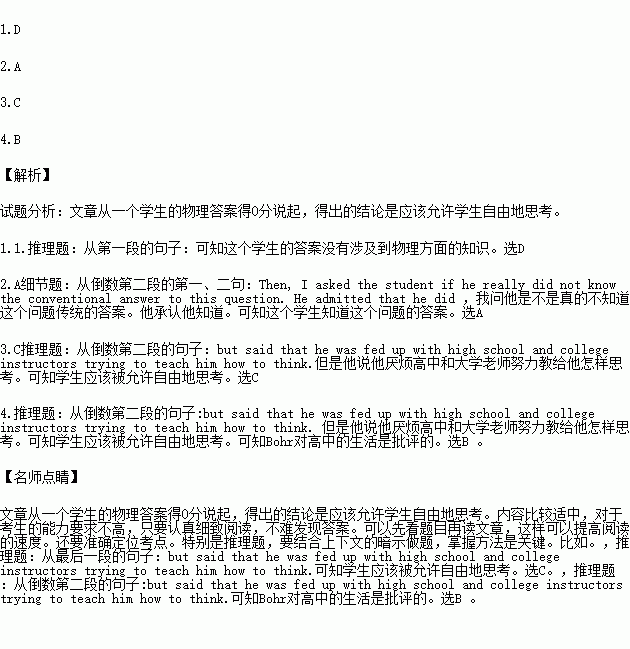题目内容
One day, I received a call from a colleague. He was about to give a student a zero for his answer to a physical problem, while the student claimed a perfect score. I was elected as their arbiter(仲裁人). I read the examination problem: “Show how it is possible to determine the height of a tall building with the aid of a barometer(气压计). ”The student had answered; "Take the barometer to the top of the building, attach a long rope to it, lower it to the street, and then bring it up, measuring the length of the rope. The length of it is the height of the building.”
The student had really answered the question completely, but the answer didn't confirm his competence in physics. I suggested the student try again. I gave him six minutes to answer the question, warning that the answer should show some knowledge of physics. Five minutes later, he said he had many answers and dashed off one, which read:“Take the barometer to the top of the building and lean over the edge of the roof. Drop the barometer, timing its fall with a stopwatch. Then, use the physical formula(公式)to calculate the height of the building.”
At this point, my colleague had to accept it, and then the student made almost full marks. I couldn't help asking the student what the other answers were. He listed many others, and then added, "Probably the best is to take the barometer to the administrator and said to him, ‘Sir, here is a fine barometer. If you tell me the height of the building, I will give it to you.”,
Then, I asked the student if he really did not know the conventional answer to this question. He admitted that he did, but said that he was fed up with high school and college instructors trying to teach him how to think.
The name of the student was Bohr who later was famous all over the world. He won the Nobel Prize for Physics in 1922.
1.The student got a zero at the beginning because _____.
A. the teacher wasn't satisfied with him
B. his answer wasn't complete or correct
C. the teacher didn't fully understand his answer
D. his answer didn't show his knowledge of physics
2.We know from the passage that _____.
A. the student knew the expected answer
B. the administrator told Bohr the height
C. the author preferred Bohr's last answer
D. the teacher was a very stubborn person
3.We can learn from the passage that _____.
A. instructors can teach students how to think
B. arbiters can help students to get high scores
C. students should be given more freedom in thinking
D. teachers should make students use physical formulas
4.What was Bohr's attitude toward his schooling?
A. Optimistic B. Critical C. Approving D. Neutral
 津桥教育计算小状元系列答案
津桥教育计算小状元系列答案随着经济的发展和人们生活水平的提高,近年各地旅游景点人满为患,尤其是一些历史名胜,如长城、紫禁城和各地大型博物馆等等。看到这种趋势,一些旅游景点开始考虑提高门票,并把此消息在各大网站上发布,这在全国引起了一场热烈的讨论,观点如下:
支持者: | 1. 促进当地经济的发展。 2. 景点需要雇佣更多的工作人员提供服务并尽快清理游客留下的垃圾。 3. 门票提高可以确保建筑物的维修。 |
反对者: | 1. 人们将失去休闲放松的地方。 2. 阻碍人们尤其是青少年了解中国的历史和文化。 3. 对于有历史意义的名胜政府应该提供经济援助,而不是依赖民众多掏腰包。 |
你的观点: | 表明态度,列举至少两点理由 |
参考词汇:maintenance 维修(n.) financial 经济的,金融的
注意:1. 对所给要点,逐一陈述,适当发挥,不要简单翻译。
2. 字数150左右。开头已经写好,不计入总字数。
With the development of our country’s economy and the people’s living standards improving,a lot of tourism attractions in different areas have witnessed a great increase of tourists in recent years, in which case some tourism sites are considering adopting higher tickets fees and have given out the news on various websites. People have held a heated discussion about it and opinions on it are divided ._____________________________.


